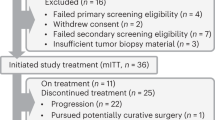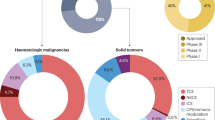Abstract
To determine whether resistance to chemoimmunotherapy is acquired during therapy, we investigated the effects of chemotherapeutic agents and anti-tumour polysaccharide, lentinan, on the progression of Rous sarcoma virus-induced S908.D2 fibrosarcomas. The chemoimmunotherapy was effective against the parental S908.D2-bearing mice. Nearly all the mice that were treated with cyclophosphamide (CY) and lentinan achieved complete tumour regression. Only a few of the mice that achieved complete regression of the primary tumours showed a recurrence of the tumour in regional lymph nodes. S908.D2-vp.1 was established from metastatic tumours that developed in the regional lymph nodes of parental S908.D2-bearing mice during therapy. S908.D2-vp.2-or vp.3 cells were sequentially derived in a similar way from S908.D2-vp.1-or-vp.2-bearing mice respectively, in which complete tumour regression at each primary site was achieved during therapy. These lines acquired resistance to CY and lentinan and also to 5-fluorouracil (5-FU)/5'-deoxy-5-fluorouracil and lentinan. No significant difference in either the sensitivity to 5-FU or 4-deoxycyclophosphamide in vitro or in the susceptibility to immune effector cells was observed between the parental and progressed lines (S908.D2-vp1 -vp3). There was an increase in the level of prostaglandin E2 (PGE2) in the progressed lines during repeated therapy (parental, 1171 pg ml(-1); vp.1, 2199 pg ml(-1); vp.2, 5500pg ml(-1); vp3, 16187 pg ml(-1)). There was no significant increase in the production of transforming growth factor beta (TGF-beta). The amount of interleukin-2 (IL-2) produced by spleen cells isolated from the S908.D2-vp.2-bearing mice was decreased compared with the amount produced by the parental S908.D2- bearing mice. Furthermore, combination therapy with lentinan and IL-2 achieved complete tumour regression in all the mice transplanted with S908.D2 progressed tumour lines, although IL-2 alone did not show any anti-tumour effects in either the S908.D2 parental or progressed lines. The findings suggest that the reduced production of IL-2 induced an increase in the production of the PGE2 by progressed tumour lines is involved in the acquisition of resistance.
This is a preview of subscription content, access via your institution
Access options
Subscribe to this journal
Receive 24 print issues and online access
$259.00 per year
only $10.79 per issue
Buy this article
- Purchase on Springer Link
- Instant access to full article PDF
Prices may be subject to local taxes which are calculated during checkout
Similar content being viewed by others
Author information
Authors and Affiliations
Rights and permissions
About this article
Cite this article
Hamuro, J., Kikuchi, T., Takatsuki, F. et al. Cancer cell progression and chemoimmunotherapy-dual effects in the induction of resistance to therapy. Br J Cancer 73, 465–471 (1996). https://doi.org/10.1038/bjc.1996.82
Issue Date:
DOI: https://doi.org/10.1038/bjc.1996.82



